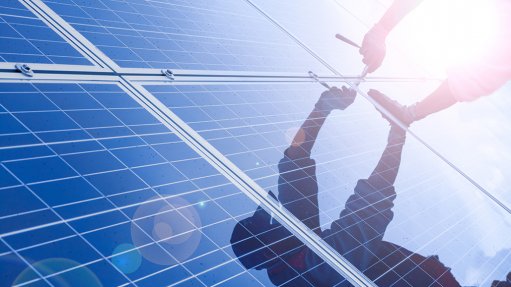Africa eager for, and Japan set to return to, nuclear energy – IAEA chief
African countries are seriously considering adopting nuclear energy, International Atomic Energy Agency (IAEA) direc- tor-general Yukiya Amano has confirmed in reply to a question from Engineering News. “We are working with Egypt, Kenya and Nigeria.” The IAEA is, of course, also working with South Africa, which already has nuclear power but is currently planning to considerably expand its nuclear generating capacity. “Other [African] countries are considering or preparing for nuclear,” he stated. “We have a milestone document. This provides guidance. We are recommending that they use it – it is also [a form of] assistance.” (The document is titled Milestones in the Development of a National Infrastructure for Nuclear Power.)
“Nigeria is preparing [for nuclear power],” he reported. “The levels of progress are different [in different countries]. Egypt and Nigeria are quite advanced in Africa.” (Egypt and Nigeria already have operational research reactors – as do Algeria, Ghana, Morocco and South Africa, while Libya has a research reactor in temporary shutdown; the Democratic Republic of the Congo’s research reactors have been permanently shut down.)
At a recent function of the Institute for Security Studies (ISS) in Johannesburg, Amano said: “African countries are very eager to use nuclear technology for development. African ambassadors frequently see me and ask me how they could use nuclear technology for development. South Africa can play a key role and is already playing an important role. South Africa is a recipient of technology but is also a donor of technology.”
Speaking about developing countries more generally, he told Engineering News: “Countries that embark on nuclear power give us their reasons. One of the reasons is to enhance economic competitiveness, development and energy security. Many countries believe nuclear power is economi- cally competitive.” He pointed out that the United Arab Emirates had started construction of a nuclear power plant while Belarus and Turkey had signed contracts. Jordan is one of the countries considering nuclear power – because the country has no indigenous sources of energy.
“We respect the decisions about nuclear power,” he affirmed. “If they want to embark on nuclear power, we want them to do it safely; 67 nuclear power plants are under construction [around the world]. By our calculations, the production of electricity by nuclear [worldwide] will increase by 23% by low projection and 100% by high projection by 2030.”
Meanwhile, the new Japanese government of Shinzo Abe (elected by a landslide vote in December) will, in Amano’s opinion, not phase out the country’s use of nuclear power. Following the accident at the Fukushima Dai-ichi nuclear power plant in March 2011, caused by a devastating earthquake and tsunami (which left more than 15 000 people dead and nearly 5 000 missing), the previous Japanese government decided to phase out all nuclear power by the 2030s. In his election campaign, Abe stated he would retain nuclear power.
“In January, I went to Japan and had meetings with Prime Minister Abe and other Ministers,” Amano told Engineering News. “My impression is that the leaders of the new government are more supportive of nuclear power. They are not talking about phasing out nuclear power by [the] 2030s. This is not the policy being considered by the Abe government. But it will take them time to establish a new energy policy. I don’t think that a new energy policy will be announced shortly.”
Also in his address to the ISS, Amano noted that Japan had 55 nuclear power reactors, of which only two were currently in operation. “Because of this, Japan has to buy oil. For the first time in 30 years, the country recorded a deficit – [because it has to import oil]. The deficit is increasing. Pollution is increasing [because of the great increase in the use of oil to fuel reactivated old power plants]. Japan is seriously considering changing course.”
He also reported that the IAEA will soon be sending a mission to Japan to help with the decontamination of the area affected by the Fukushima accident. He added that there are now more than 60 technologies available for decontamination. “The Fukushima accident was a very strong wake-up call on safety,” affirmed Amano. “The IAEA is implementing an action plan to increase safety. Nuclear power is safer now than before Fukushima. All countries with nuclear reactors have conducted stress tests.” The ability of existing nuclear power plants to survive extreme events has been reviewed worldwide and additional safety features have been introduced.
“Fukushima Dai-ichi was crippled by a great earthquake and tsunami. But there were also human errors. There was a weak regulator,” he warned. Strong regulators are required to ensure nuclear safety.
Comments
Press Office
Announcements
What's On
Subscribe to improve your user experience...
Option 1 (equivalent of R125 a month):
Receive a weekly copy of Creamer Media's Engineering News & Mining Weekly magazine
(print copy for those in South Africa and e-magazine for those outside of South Africa)
Receive daily email newsletters
Access to full search results
Access archive of magazine back copies
Access to Projects in Progress
Access to ONE Research Report of your choice in PDF format
Option 2 (equivalent of R375 a month):
All benefits from Option 1
PLUS
Access to Creamer Media's Research Channel Africa for ALL Research Reports, in PDF format, on various industrial and mining sectors
including Electricity; Water; Energy Transition; Hydrogen; Roads, Rail and Ports; Coal; Gold; Platinum; Battery Metals; etc.
Already a subscriber?
Forgotten your password?
Receive weekly copy of Creamer Media's Engineering News & Mining Weekly magazine (print copy for those in South Africa and e-magazine for those outside of South Africa)
➕
Recieve daily email newsletters
➕
Access to full search results
➕
Access archive of magazine back copies
➕
Access to Projects in Progress
➕
Access to ONE Research Report of your choice in PDF format
RESEARCH CHANNEL AFRICA
R4500 (equivalent of R375 a month)
SUBSCRIBEAll benefits from Option 1
➕
Access to Creamer Media's Research Channel Africa for ALL Research Reports on various industrial and mining sectors, in PDF format, including on:
Electricity
➕
Water
➕
Energy Transition
➕
Hydrogen
➕
Roads, Rail and Ports
➕
Coal
➕
Gold
➕
Platinum
➕
Battery Metals
➕
etc.
Receive all benefits from Option 1 or Option 2 delivered to numerous people at your company
➕
Multiple User names and Passwords for simultaneous log-ins
➕
Intranet integration access to all in your organisation


















